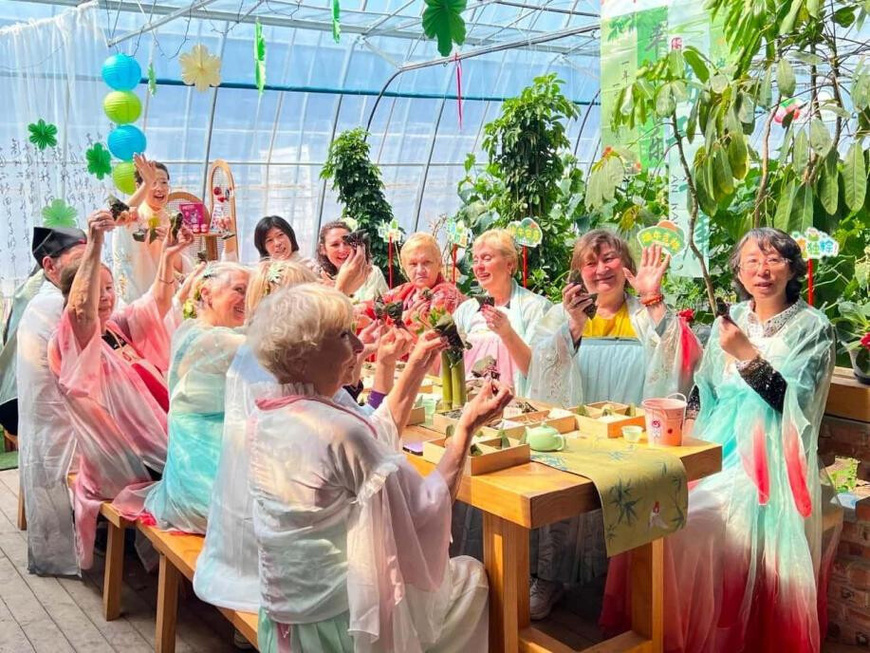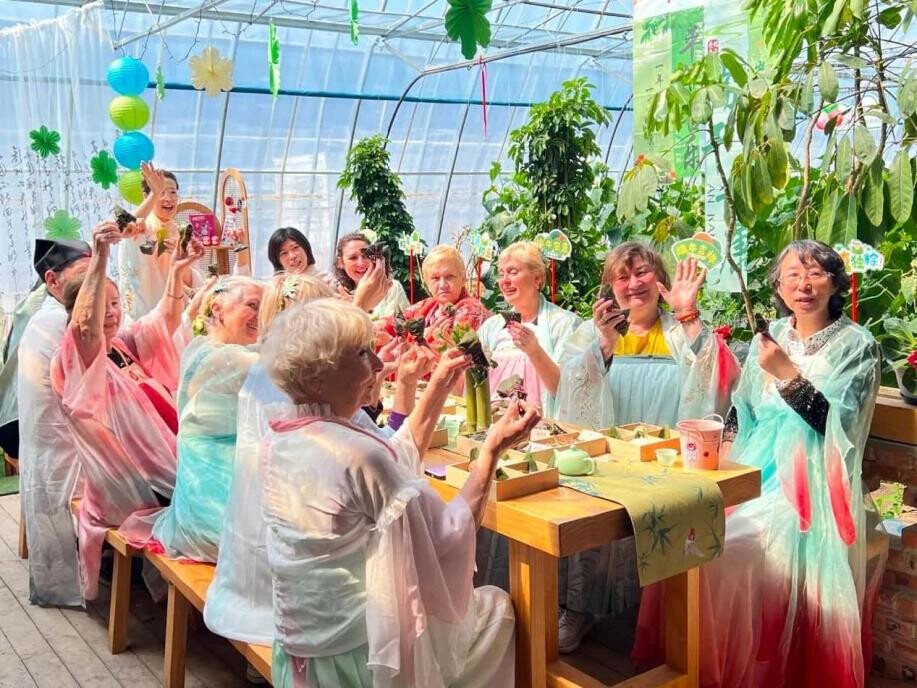By Wang Yuan, Zhou Zhou, People's Daily

Russian guests make zongzi, a glutinous rice dumpling wrapped in bamboo or reed leaves to mark China's Dragon Boat Festival, with local residents in Nanhan village, Funing township, Suifenhe, northeast China's Heilongjiang province. (Photo by Zhang Chao)
Located in northeast China's Heilongjiang province, Suifenhe was established in 1903 following the construction of the Chinese Eastern Railway. Dubbed "a train-forged city," this border town has grown in tandem with the railway and flourished through its port.
Today, walking through this border city, one encounters a vibrant tapestry of Chinese-Russian culture, storefronts adorned with bilingual signs, candy-colored Russian architecture, clusters of foreign visitors, and local vendors fluent in both Chinese and Russian - painting a vivid picture of close cultural and people-to-people exchanges.
The Chinese Eastern Railway, a branch line of the Trans-Siberian Railway, stretches from Manzhouli in the west to Suifenhe in the east. The railway has breathed new life into the city, promoting cultural and commercial exchanges and making Suifenhe one of the first cities in China's northeastern border region to gain access to trains, motor vehicles, electricity, and telephone services.
In 1987, Suifenhe and Russia's Pogranichny launched cross-border trade with a symbolic exchange: 1,000 thermos flasks and 100,000 kilograms of apples for 30,000 kilograms of halibut and 50,000 kilograms of pollock.
During the 1990s, barter trade flourished among ordinary citizens . Streets buzzed with activity as locals set up stalls, exchanging daily necessities such as snacks and toys for Russian leather goods - a scene that remains etched in the collective memory of Suifenhe's residents.
As one of China's pioneering border cities to expand opening-up, Suifenhe boasts both highway and railway ports at the Chinese national level, serving as a vital node in the China-Mongolia-Russia Economic Corridor and an important gateway for the eastern route of the China-Europe freight train service. The city's railway port now handles over 10 million tons of goods annually, with nearly 900 train trips each year. China-Europe freight trains departing here reach five European countries, while inbound trains serve 25 Chinese cities, cementing this border town's status as a genuine "international commercial hub."
Throughout Suifenhe's urban areas and countryside stand numerous Russian-style buildings. These structures preserve the architectural style of the early 20th century along the railway, serving as a "three-dimensional" testament to Suifenhe's urban development and the mutual exchange of Eastern and Western civilizations.
Russian social media influencer Artem always commutes between Russia and Suifenhe by train. He loves promoting Suifenhe's cultural and tourism highlights to Russian audiences on social media, with 220,000 followers.
"Compared to my first trip here with my family 20 years ago, transportation is much more convenient now - they even opened an airport last year," he noted. "Many Russian tourists take trains here to explore the food and culture of China's northeast region, and they always go home happy. The city's blend of Russian and Chinese charm makes everyone feel right at home."
In November 2023, Wang Xuehan, a student at Suifenhe No. 1 High School, traveled to Pogranichny to stay with the family of Russian student Lisa. She participated in the "China-Russia student homestay exchange program" launched by the local government in 2006. During her stay, she was welcomed by local fresh fruits, seafood, and handmade gifts like bracelets and dolls crafted by Liza and her sister Alina. "I made Russian blini with my Russian classmates in cooking class. We were covered in flour but laughed non-stop," Wang recalled.
The following spring, Lisa and Alina visited Wang's family as promised, their suitcases filled with Russian specialties and heartfelt care. "They brought my favorite Russian candies and fresh shrimp," Wang recounted.
The trip left vivid memories for the sisters. They participated in a school sports meet, played traditional Chinese games, and experienced paper-cutting. "Every day in Suifenhe felt as warm as home," Lisa later wrote in Russian. Today, the students continue to stay in touch across borders.
Over the years, more than 400 students have participated in the homestay exchange program. Annual events like the China-Russia international youth art festival and youth sports exchanges provide fertile ground for lasting friendships.
A monument in the central square of Suifenhe recounts another story of the China-Russia friendship. Galia, a Chinese-Russian woman, bravely ventured to a fortress on the Tianchang Mountain to negotiate with Japanese invaders to protect innocent civilian hostages in 1945, on the eve of victory in the Chinese People's War of Resistance Against Japanese Aggression. Though she never returned - losing her life at the age of 17 - her legacy lives on.
At the nearby Peace Angel Galia memorial hall, artifacts, photos, and videos recount her bravery. "Galia is remembered as a symbol of Russia-China friendship. Her story reminds us of the deep bonds between our peoples - bonds that should be preserved and passed on," said a visiting Russian tourist.
Today, walking through this border city, one encounters a vibrant tapestry of Chinese-Russian culture, storefronts adorned with bilingual signs, candy-colored Russian architecture, clusters of foreign visitors, and local vendors fluent in both Chinese and Russian - painting a vivid picture of close cultural and people-to-people exchanges.
The Chinese Eastern Railway, a branch line of the Trans-Siberian Railway, stretches from Manzhouli in the west to Suifenhe in the east. The railway has breathed new life into the city, promoting cultural and commercial exchanges and making Suifenhe one of the first cities in China's northeastern border region to gain access to trains, motor vehicles, electricity, and telephone services.
In 1987, Suifenhe and Russia's Pogranichny launched cross-border trade with a symbolic exchange: 1,000 thermos flasks and 100,000 kilograms of apples for 30,000 kilograms of halibut and 50,000 kilograms of pollock.
During the 1990s, barter trade flourished among ordinary citizens . Streets buzzed with activity as locals set up stalls, exchanging daily necessities such as snacks and toys for Russian leather goods - a scene that remains etched in the collective memory of Suifenhe's residents.
As one of China's pioneering border cities to expand opening-up, Suifenhe boasts both highway and railway ports at the Chinese national level, serving as a vital node in the China-Mongolia-Russia Economic Corridor and an important gateway for the eastern route of the China-Europe freight train service. The city's railway port now handles over 10 million tons of goods annually, with nearly 900 train trips each year. China-Europe freight trains departing here reach five European countries, while inbound trains serve 25 Chinese cities, cementing this border town's status as a genuine "international commercial hub."
Throughout Suifenhe's urban areas and countryside stand numerous Russian-style buildings. These structures preserve the architectural style of the early 20th century along the railway, serving as a "three-dimensional" testament to Suifenhe's urban development and the mutual exchange of Eastern and Western civilizations.
Russian social media influencer Artem always commutes between Russia and Suifenhe by train. He loves promoting Suifenhe's cultural and tourism highlights to Russian audiences on social media, with 220,000 followers.
"Compared to my first trip here with my family 20 years ago, transportation is much more convenient now - they even opened an airport last year," he noted. "Many Russian tourists take trains here to explore the food and culture of China's northeast region, and they always go home happy. The city's blend of Russian and Chinese charm makes everyone feel right at home."
In November 2023, Wang Xuehan, a student at Suifenhe No. 1 High School, traveled to Pogranichny to stay with the family of Russian student Lisa. She participated in the "China-Russia student homestay exchange program" launched by the local government in 2006. During her stay, she was welcomed by local fresh fruits, seafood, and handmade gifts like bracelets and dolls crafted by Liza and her sister Alina. "I made Russian blini with my Russian classmates in cooking class. We were covered in flour but laughed non-stop," Wang recalled.
The following spring, Lisa and Alina visited Wang's family as promised, their suitcases filled with Russian specialties and heartfelt care. "They brought my favorite Russian candies and fresh shrimp," Wang recounted.
The trip left vivid memories for the sisters. They participated in a school sports meet, played traditional Chinese games, and experienced paper-cutting. "Every day in Suifenhe felt as warm as home," Lisa later wrote in Russian. Today, the students continue to stay in touch across borders.
Over the years, more than 400 students have participated in the homestay exchange program. Annual events like the China-Russia international youth art festival and youth sports exchanges provide fertile ground for lasting friendships.
A monument in the central square of Suifenhe recounts another story of the China-Russia friendship. Galia, a Chinese-Russian woman, bravely ventured to a fortress on the Tianchang Mountain to negotiate with Japanese invaders to protect innocent civilian hostages in 1945, on the eve of victory in the Chinese People's War of Resistance Against Japanese Aggression. Though she never returned - losing her life at the age of 17 - her legacy lives on.
At the nearby Peace Angel Galia memorial hall, artifacts, photos, and videos recount her bravery. "Galia is remembered as a symbol of Russia-China friendship. Her story reminds us of the deep bonds between our peoples - bonds that should be preserved and passed on," said a visiting Russian tourist.
 Menu
Menu
 Border city in NE China builds close China-Russia friendship
Border city in NE China builds close China-Russia friendship
















